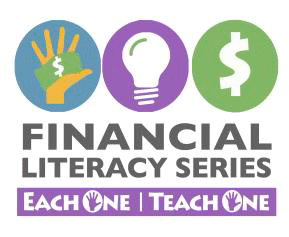
NBTA Credit Union is proud to be a partner of Vancity’s Award Winning Each One Teach One (EOTO) Financial Literacy Series. EOTO is an innovative program that trains employees of financial institutions to deliver basic financial skills workshops in community settings.
Delivered in plain language — and in staff rooms, church basements, neighbourhood houses and community centres — the approach of Each One, Teach One is to meet individuals where they are, when they seek training.
The workshops may have as few as half a dozen participants, or as many as one hundred, and be as short as an hour or as long as a half-day.
The workshops in the Each One, Teach One series, and the approach to training staff to become certified volunteer trainers in the community was conceived by staff at Vancity credit union in British Columbia.
Benefits of Financial Literacy
There are benefits to providing financial literacy basics to members of our communities. The positive effects of improved financial literacy include:
- Increased hopefulness and orientation towards the future
- Reduced stress
- Increased self reliance
- Enhanced social capital
- Enhanced inclusion or sense of belonging
- Reduced risks associated with key financial choices and life events
Modules Our Certified Trainers Can Deliver (About 1 hour each):
These modules are delivered in plain language in a 100% non-sales oriented environment – We’re in the community to provide the education, not to sell. To request a session to be delivered, please email FinancialLiteracy@nbtacu.nb.ca .
01-INTRODUCTION TO BASIC BANKING
- How to choose the right bank account for your needs
- How to make interest work for you — not against you
- Ways to reduce your account and transaction fees
02-INTRODUCTION TO BASIC BUDGETING
- What a budget is and why should you create one
- Tips to help you reach your financial goals
- Ideas to help you adjust your spending
03-WHY FILING TAXES IN CANADA IS A GOOD IDEA
- How income taxes are used
- Why it makes sense to file your tax return, even if you don’t owe money
- Benefits available to lower-income tax-payers in Canada
04-CREDIT CARDS AND PREPAID CARDS
- Advantages and disadvantages of credit cards and prepaid cards
- Important things to look for in a prepaid card agreement
- How to figure out the real cost of using credit and prepaid cards
05-LOANS YOU DON’T WANT
- How to calculate the real cost of ‘bad’ loans
- Why payday loans and pawnshop loans are a terrible option
- The real cost of using credit card cash advances
06-LOANS: COSTS AND OBLIGATIONS
- How to decide what kind of loan is best for your needs
- How to understand payment terms and obligations
- How interest in calculated and why it matters
07-DEBT SMARTS
- Tips to manage your debt
- When it makes sense to get a consolidation loan
- The difference between consumer proposal and bankruptcy
08-BUILDING A HEALTHY CREDIT HISTORY
- Why your credit history matters to you
- Simple steps to build a good credit score
- What to do if you need to get yourself out of financial trouble
09-IDENTITY THEFT AND FRAUD PREVENTION
- How thieves steal and use your personal information
- Tips to keep your financial and personal information safe
- What to do if you’re the victim of fraud or identity theft
10-RRSPs AND TFSAs
- The benefits of using RRSPs and TFSAs
- How to decide whether to invest in an RRSP, a TFSA or both
- The different kinds of RRSP and TFSA products (with no sales pitch!)
11-INTRODUCTION TO REGISTERED EDUCATION SAVINGS PLANS (RESPs)
- What an RESP is and how they work
- How to decide what kind of RESP is best for your family
- Free money to help grow your RESP
12-UNDERSTANDING CONTRACTS
- What makes a contract valid
- Things to watch for in a cellphone contract
- Why you should avoid rent-to-own contracts
